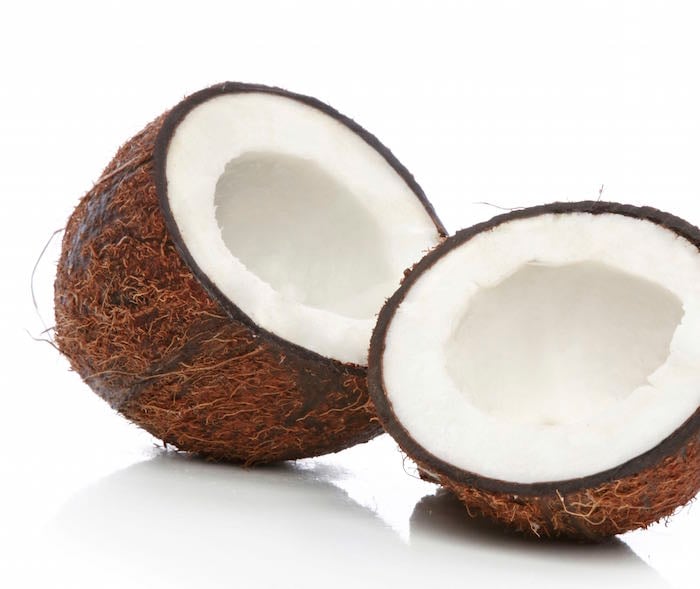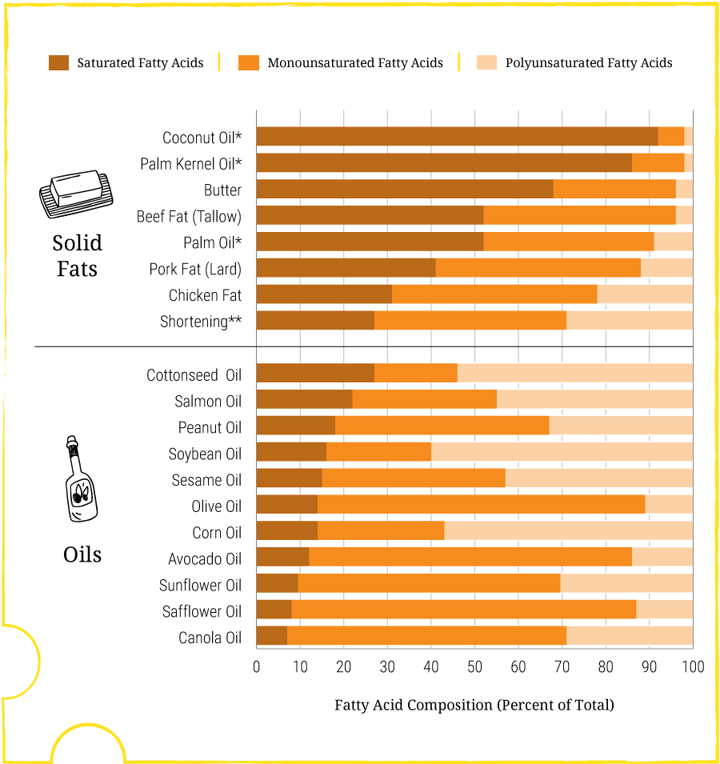
Coconut Oil is now considered one of the best super-foods by some of today’s healthiest nutritionists, scientists and chefs.
It’s loved because of it’s health benefits — lowering cholesterol, supporting aging and those who are affected by Alzheimers, helping folks lose weight and simply supporting healthy body functioning. (Source)
Prior to now, this oil had a bad rap for years. Coconut oil has one of the highest saturated fat levels of any oil out there (91%). And given that saturated fat has historically been considered one of the worst types of fat to eat, coconut products were off limits to anyone who wanted to be healthy — especially during the low-fat craze of the 80s & 90s.

The New Way Of Thinking About Coconut Oil
Now many nutritionists and researchers are re-thinking (and actively fighting) the old way that they used to look at coconut oil and the anti-coconut advice that they used to preach. In fact, they are now calling it one of the healthiest oils of today.
Dr. David Ludwig wrote the book Always Hungry, in which he advocated that people need more fat in our diets to be healthier. Dr. Mark Hyman runs an Eat Fat Get Thin program, and also believes strongly in the need for a high amount of fat in peoples diet — especially coconut oil (Source).
The Debate
As new data on fat (especially saturated fat) and cholesterol are brought to the table, researchers and scientists are continually weighing the data that they used to support (which is essentially an anti-coconut and saturated-fat view point) and transforming their advice to support the new data (the pro-coconut crowd).
Many researchers have come right out and said specifically, “I was wrong before!”.
At the same time, other scientists have had a hard time letting go of old views, simply because there is such an ingrained desire to avoid saturated fats for fear that they will make us fat, sick or unhealthy.
While this coconut oil topic continues to be hotly debated in the scientific community, foodies in the natural foods industry have spread the word on this oil and it’s demand has gone through the roof.
Let’s go through each of the pros and cons of this oil from both view points. As a manufacturer, you will need to know the industry trends on what your target market is looking for (and why the industry is so pro-coconut right now), as well as why there may be any push-back on this oil being used as an ingredient.
The Pros of Coconut Oil
Anti-Bacterial / Anti Virus
The most abundant fatty acid in coconut oil is the 12-carbon lauric acid, which is broken down into a compound called monolaurin in the body. Lauric acid and monolaurin are both very interesting due to the fact that they can kill microbes like bacteria, fungi and viruses. For this reason, coconut oil can be protective against various infections (Source)
Medium Chain Triglycerides (MCTs)
Most of the fatty acids in the diet are long-chain fatty acids, but coconut oil contains a different kind: medium chain triglycerides. These medium-chain fatty acids are metabolized differently; they go straight to the liver from the digestive tract, where they are used as a quick source energy or turned into so-called ketone bodies, which can have therapeutic effects on brain disorders like epilepsy and Alzheimer’s. (Source)
Supports Weight Loss
There is considerable evidence that coconut oil can help you lose weight. In a study of 40 women with abdominal obesity, coconut oil reduced waist circumference compared to soybean oil (14) while also improving other health markers. (Source)
In addition, the medium-chain triglycerides (MCTs) in coconut oil can increase energy expenditure compared to the same amount of calories from longer chain fats. One study found that 15-30 grams of MCTs per day increased 24 hour energy expenditure by 5%, totaling about 120 calories per day. (Source)
Protective To Hair & Skin
Coconut oil can also be very protective against hair damage and one study shows that it may be equally as effective as sunscreen, blocking about 20% of the sun’s ultraviolet rays. (Source)
Doesn’t Affect Heart Health (debated)
There are new research studies that show that there is no association between saturated fat and heart disease. And even more interestingly, that the saturated fat found in food doesn’t necessarily correlate with your body’s saturated fat levels. In other words, they are now thinking that eating more saturated fats in your food will not necessarily bring up your saturated fat levels in your body. Many researchers believe that saturated fat was unfairly demonized a few decades ago by a few biased but highly influential scientists. Of course, this point is still hotly debated. (Source)
Many who support coconut oil use the traditional Polynesian diet as an example — this diet is very high in coconut oil, and these people have very low instances of heart disease.
The Cons Of Coconut Oil
Affects Heart Health (debated)
Coconut oil is a solid oil, made up primarily of unsaturated fat (about 91%). This is an incredibly high level of saturated fat, which has been historically known as the unhealthiest kind of fat.
While the 2015 Healthy Food Guidelines now include free-reign on eating oils high in monounsaturated and polyunsaturated fats, they don’t yet recommend this for saturated fats. Still this new USDA recommendation is a tremendous metamorphosis from the prior food pyramid of the 90’s that suggested keeping ANY oil consumption extremely limited.
The Polynesian Diet Example Is Unproven
While the coconut oil industry likes to point out that the traditional Polynesian diet – high in tropical oils like coconut – is linked with relatively low rates of heart disease, many researchers still refuse this claim.
“It’s important to remember, however, that heart disease involves several variables,” counters Dr. Jay Kenney.
“Yes, studies of people on traditional Polynesian diets have found that they have relatively low rates from heart disease despite high LDL cholesterol levels, but other aspects of their native lifestyle are very healthful, and probably help counteract the cholesterol-raising effect of the coconut fat.
Their traditional diet, for example, is very high in dietary fiber and heart-healthy omega 3 fatty acids from fish, and very low in sodium. Historically, native Polynesians also tended to be nonsmokers, and were physically very active. All these factors would certainly promote heart health.” (Source)
Lack Of Long-Term Studies
“Most of the research so far has consisted of short-term studies to examine its effect on cholesterol levels. We don’t really know how coconut oil affects heart disease,” wrote Walter C. Willett, M.D., chair of the Department of Nutrition at the Harvard School for Public Health, in a newsletter. “And I don’t think coconut oil is as healthful as vegetable oils like olive oil and soybean oil, which are mainly unsaturated fat and therefore both lower LDL and increase HDL.”
In Conclusion
While coconut oil remains a highly debated oil by researchers and scientists, foodies in the natural industry aren’t waiting around for the final results — most firmly believe in the new science supporting coconut oil and are eager to eat as much as possible.
If you are a food manufacturer, you should know that consumer demand is going up — and for good (scientifically supported) reasons.
Topics: Coconut Oil













